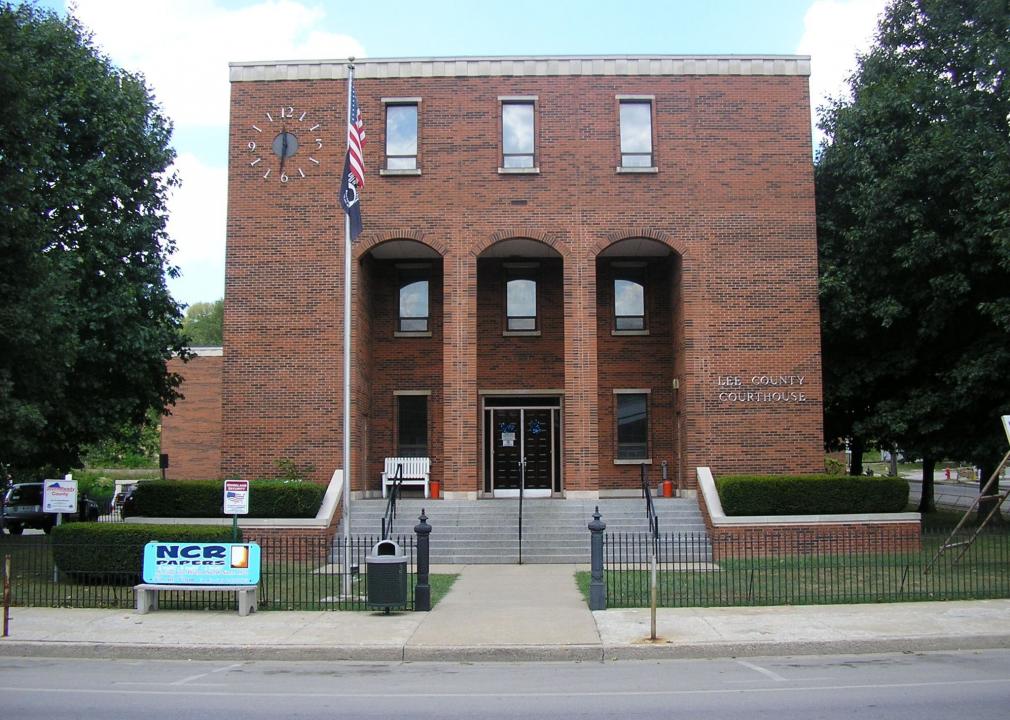Counties with the highest rate of food insecure children in Kentucky
Published 8:59 pm Tuesday, September 13, 2022
W.marsh // Wikimedia Commons
Counties with the highest rate of food insecure children in Kentucky
Food insecurity is a widespread problem in the United States, with people experiencing food insecurity in every single county in the nation. The nonprofit Feeding America describes food insecurity as “a lack of consistent access to enough food for every person in a household to live an active, healthy life.”
Food insecurity hits children particularly hard. The USDA estimates that more than 5.5 million children lived in food-insecure households in 2021. Not having consistent access to enough food can affect cognitive abilities, overall health, moods, and attention spans—not to mention the psychological effects of living with scarcity.
Stacker compiled a list of counties in Kentucky with the highest rate of food insecure children using data from Feeding America. Counties are ranked by highest percent of children with food insecurity as of 2020. Kentucky has a child food insecurity rate of 16.1%, which ranks #13 highest among all states.
States with the highest rate of food insecure children
#1. Louisiana: 21.5%
#2. New Mexico: 20.5%
#3. Mississippi: 20.4%
#4. Alabama: 19.8%
#5. Arkansas: 19.7%
States with the lowest rate of food insecure children
#1. North Dakota: 8.1%
#2. Massachusetts: 8.8%
#3. New Jersey: 9.0%
#4. Minnesota: 9.3%
#5. New Hampshire: 9.5%
Read on to see where food insecurity is most prevalent in Kentucky.
![]()
Dcoetzee // Wikimedia Commons
#50. Trigg County
– Child food insecurity rate: 19.6% (630 total)
— 3.5% higher than national average
– Food insecurity rate: 14.0% (2,040 total)
— 2.2% higher than national average
– Annual food budget shortfall: $965,000
— Cost per meal: $2.94
Nyttend // Wikimedia Commons
#49. Clinton County
– Child food insecurity rate: 19.7% (430 total)
— 3.6% higher than national average
– Food insecurity rate: 15.9% (1,620 total)
— 4.1% higher than national average
– Annual food budget shortfall: $733,000
— Cost per meal: $2.81
Nyttend // Wikimedia Commons
#48. Pulaski County
– Child food insecurity rate: 19.8% (2,860 total)
— 3.7% higher than national average
– Food insecurity rate: 16.7% (10,790 total)
— 4.9% higher than national average
– Annual food budget shortfall: $4,928,000
— Cost per meal: $2.84
w:User:Malepheasant // Wikimedia Commons
#47. Boyd County
– Child food insecurity rate: 19.9% (2,020 total)
— 3.8% higher than national average
– Food insecurity rate: 16.0% (7,590 total)
— 4.2% higher than national average
– Annual food budget shortfall: $3,530,000
— Cost per meal: $2.89
Nyttend // Wikimedia Commons
#46. Morgan County
– Child food insecurity rate: 19.9% (490 total)
— 3.8% higher than national average
– Food insecurity rate: 16.8% (2,230 total)
— 5.0% higher than national average
– Annual food budget shortfall: $1,039,000
— Cost per meal: $2.89
Brian Stansberry // Wikimedia Commons
#45. Monroe County
– Child food insecurity rate: 20.2% (480 total)
— 4.1% higher than national average
– Food insecurity rate: 16.8% (1,780 total)
— 5.0% higher than national average
– Annual food budget shortfall: $829,000
— Cost per meal: $2.89
verygreen // Wikimedia Commons
#44. Rockcastle County
– Child food insecurity rate: 20.2% (750 total)
— 4.1% higher than national average
– Food insecurity rate: 16.4% (2,760 total)
— 4.6% higher than national average
– Annual food budget shortfall: $1,226,000
— Cost per meal: $2.76
FloNight (Sydney Poore) and Russell Poore // Wikimedia Commons
#43. Fleming County
– Child food insecurity rate: 20.3% (720 total)
— 4.2% higher than national average
– Food insecurity rate: 16.3% (2,370 total)
— 4.5% higher than national average
– Annual food budget shortfall: $1,104,000
— Cost per meal: $2.89
Turover // Wikimedia Commons
#42. Greenup County
– Child food insecurity rate: 20.3% (1,540 total)
— 4.2% higher than national average
– Food insecurity rate: 15.1% (5,350 total)
— 3.3% higher than national average
– Annual food budget shortfall: $2,731,000
— Cost per meal: $3.17
Bedford // Wikimedia Commons
#41. Webster County
– Child food insecurity rate: 20.3% (610 total)
— 4.2% higher than national average
– Food insecurity rate: 16.8% (2,180 total)
— 5.0% higher than national average
– Annual food budget shortfall: $1,016,000
— Cost per meal: $2.89
Nyttend // Wikimedia Commons
#40. Green County
– Child food insecurity rate: 20.5% (470 total)
— 4.4% higher than national average
– Food insecurity rate: 17.3% (1,910 total)
— 5.5% higher than national average
– Annual food budget shortfall: $859,000
— Cost per meal: $2.79
Nyttend // Wikimedia Commons
#39. Powell County
– Child food insecurity rate: 20.5% (620 total)
— 4.4% higher than national average
– Food insecurity rate: 17.3% (2,120 total)
— 5.5% higher than national average
– Annual food budget shortfall: $998,000
— Cost per meal: $2.92
W.marsh // Wikimedia Commons
#38. Rowan County
– Child food insecurity rate: 20.5% (990 total)
— 4.4% higher than national average
– Food insecurity rate: 17.4% (4,260 total)
— 5.6% higher than national average
– Annual food budget shortfall: $1,984,000
— Cost per meal: $2.89
JERRYE & ROY KLOTZ MD // Wikimedia Commons
#37. Wayne County
– Child food insecurity rate: 20.6% (880 total)
— 4.5% higher than national average
– Food insecurity rate: 16.1% (3,300 total)
— 4.3% higher than national average
– Annual food budget shortfall: $1,492,000
— Cost per meal: $2.81
Nyttend // Wikimedia Commons
#36. Casey County
– Child food insecurity rate: 20.9% (760 total)
— 4.8% higher than national average
– Food insecurity rate: 17.3% (2,760 total)
— 5.5% higher than national average
– Annual food budget shortfall: $1,226,000
— Cost per meal: $2.76
Nyttend // Wikimedia Commons
#35. Lawrence County
– Child food insecurity rate: 20.9% (790 total)
— 4.8% higher than national average
– Food insecurity rate: 18.5% (2,890 total)
— 6.7% higher than national average
– Annual food budget shortfall: $1,277,000
— Cost per meal: $2.74
C. Bedford Crenshaw // Wikimedia Commons
#34. Caldwell County
– Child food insecurity rate: 21.1% (600 total)
— 5.0% higher than national average
– Food insecurity rate: 15.5% (1,970 total)
— 3.7% higher than national average
– Annual food budget shortfall: $918,000
— Cost per meal: $2.89
Jim.henderson // Wikimedia Commons
#33. Hopkins County
– Child food insecurity rate: 21.1% (2,180 total)
— 5.0% higher than national average
– Food insecurity rate: 15.7% (7,050 total)
— 3.9% higher than national average
– Annual food budget shortfall: $3,286,000
— Cost per meal: $2.89
Brian Stansberry // Wikimedia Commons
#32. Hickman County
– Child food insecurity rate: 21.2% (190 total)
— 5.1% higher than national average
– Food insecurity rate: 14.4% (640 total)
— 2.6% higher than national average
– Annual food budget shortfall: $291,000
— Cost per meal: $2.83
Wdzinc // Wikimedia Commons
#31. Marion County
– Child food insecurity rate: 21.3% (990 total)
— 5.2% higher than national average
– Food insecurity rate: 16.2% (3,120 total)
— 4.4% higher than national average
– Annual food budget shortfall: $1,404,000
— Cost per meal: $2.79
Smceuen // Wikimedia Commons
#30. Carroll County
– Child food insecurity rate: 21.6% (600 total)
— 5.5% higher than national average
– Food insecurity rate: 16.1% (1,730 total)
— 4.3% higher than national average
– Annual food budget shortfall: $807,000
— Cost per meal: $2.90
Kybluegrass // Wikimedia Commons
#29. McCreary County
– Child food insecurity rate: 21.6% (820 total)
— 5.5% higher than national average
– Food insecurity rate: 20.2% (3,500 total)
— 8.4% higher than national average
– Annual food budget shortfall: $1,630,000
— Cost per meal: $2.89
Huw Williams (Huwmanbeing) // Wikimedia Commons
#28. Grayson County
– Child food insecurity rate: 22.0% (1,390 total)
— 5.9% higher than national average
– Food insecurity rate: 17.6% (4,640 total)
— 5.8% higher than national average
– Annual food budget shortfall: $1,960,000
— Cost per meal: $2.62
Nyttend // Wikimedia Commons
#27. Metcalfe County
– Child food insecurity rate: 22.0% (520 total)
— 5.9% higher than national average
– Food insecurity rate: 16.8% (1,690 total)
— 5.0% higher than national average
– Annual food budget shortfall: $751,000
— Cost per meal: $2.76
W.marsh // Wikimedia Commons
#26. Bath County
– Child food insecurity rate: 22.1% (700 total)
— 6.0% higher than national average
– Food insecurity rate: 18.6% (2,310 total)
— 6.8% higher than national average
– Annual food budget shortfall: $1,088,000
— Cost per meal: $2.92
Brian Stansberry // Wikimedia Commons
#25. Christian County
– Child food insecurity rate: 22.2% (4,290 total)
— 6.1% higher than national average
– Food insecurity rate: 15.4% (11,010 total)
— 3.6% higher than national average
– Annual food budget shortfall: $5,206,000
— Cost per meal: $2.94
Nyttend // Wikimedia Commons
#24. Martin County
– Child food insecurity rate: 22.2% (500 total)
— 6.1% higher than national average
– Food insecurity rate: 18.8% (2,150 total)
— 7.0% higher than national average
– Annual food budget shortfall: $996,000
— Cost per meal: $2.88
Nyttend // Wikimedia Commons
#23. Perry County
– Child food insecurity rate: 22.3% (1,340 total)
— 6.2% higher than national average
– Food insecurity rate: 18.1% (4,750 total)
— 6.3% higher than national average
– Annual food budget shortfall: $2,272,000
— Cost per meal: $2.97
CoryClaxon // Wikimedia Commons
#22. Carter County
– Child food insecurity rate: 22.8% (1,420 total)
— 6.7% higher than national average
– Food insecurity rate: 18.4% (4,970 total)
— 6.6% higher than national average
– Annual food budget shortfall: $2,649,000
— Cost per meal: $3.31
Nyttend // Wikimedia Commons
#21. Barren County
– Child food insecurity rate: 23.8% (2,480 total)
— 7.7% higher than national average
– Food insecurity rate: 17.8% (7,860 total)
— 6.0% higher than national average
– Annual food budget shortfall: $3,493,000
— Cost per meal: $2.76
Nyttend // Wikimedia Commons
#20. Pike County
– Child food insecurity rate: 23.8% (2,870 total)
— 7.7% higher than national average
– Food insecurity rate: 19.2% (11,260 total)
— 7.4% higher than national average
– Annual food budget shortfall: $5,405,000
— Cost per meal: $2.98
Nyttend // Wikimedia Commons
#19. Knox County
– Child food insecurity rate: 23.9% (1,740 total)
— 7.8% higher than national average
– Food insecurity rate: 20.6% (6,450 total)
— 8.8% higher than national average
– Annual food budget shortfall: $2,962,000
— Cost per meal: $2.85
W.marsh // Wikimedia Commons
#18. Jackson County
– Child food insecurity rate: 24.0% (720 total)
— 7.9% higher than national average
– Food insecurity rate: 21.9% (2,920 total)
— 10.1% higher than national average
– Annual food budget shortfall: $1,284,000
— Cost per meal: $2.73
C. Bedford Crenshaw // Wikimedia Commons
#17. Lewis County
– Child food insecurity rate: 24.0% (720 total)
— 7.9% higher than national average
– Food insecurity rate: 19.6% (2,610 total)
— 7.8% higher than national average
– Annual food budget shortfall: $1,143,000
— Cost per meal: $2.72
Nyttend // Wikimedia Commons
#16. Menifee County
– Child food insecurity rate: 24.3% (330 total)
— 8.2% higher than national average
– Food insecurity rate: 17.5% (1,130 total)
— 5.7% higher than national average
– Annual food budget shortfall: $526,000
— Cost per meal: $2.89
JERRYE & ROY KLOTZ MD // Wikimedia Commons
#15. Owsley County
– Child food insecurity rate: 25.0% (210 total)
— 8.9% higher than national average
– Food insecurity rate: 21.7% (960 total)
— 9.9% higher than national average
– Annual food budget shortfall: $422,000
— Cost per meal: $2.73
Nyttend // Wikimedia Commons
#14. Estill County
– Child food insecurity rate: 25.8% (760 total)
— 9.7% higher than national average
– Food insecurity rate: 20.2% (2,870 total)
— 8.4% higher than national average
– Annual food budget shortfall: $1,346,000
— Cost per meal: $2.91
Nyttend // Wikimedia Commons
#13. Floyd County
– Child food insecurity rate: 25.9% (2,020 total)
— 9.8% higher than national average
– Food insecurity rate: 20.8% (7,470 total)
— 9.0% higher than national average
– Annual food budget shortfall: $3,665,000
— Cost per meal: $3.05
Nyttend // Wikimedia Commons
#12. Bell County
– Child food insecurity rate: 26.1% (1,460 total)
— 10.0% higher than national average
– Food insecurity rate: 21.9% (5,790 total)
— 10.1% higher than national average
– Annual food budget shortfall: $2,667,000
— Cost per meal: $2.86
Nyttend // Wikimedia Commons
#11. Elliott County
– Child food insecurity rate: 26.7% (360 total)
— 10.6% higher than national average
– Food insecurity rate: 20.8% (1,550 total)
— 9.0% higher than national average
– Annual food budget shortfall: $826,000
— Cost per meal: $3.31
W.marsh // Wikimedia Commons
#10. Lee County
– Child food insecurity rate: 27.6% (400 total)
— 11.5% higher than national average
– Food insecurity rate: 21.8% (1,550 total)
— 10.0% higher than national average
– Annual food budget shortfall: $682,000
— Cost per meal: $2.73
Nyttend // Wikimedia Commons
#9. Letcher County
– Child food insecurity rate: 27.8% (1,320 total)
— 11.7% higher than national average
– Food insecurity rate: 22.6% (4,950 total)
— 10.8% higher than national average
– Annual food budget shortfall: $2,336,000
— Cost per meal: $2.93
Nyttend // Wikimedia Commons
#8. Wolfe County
– Child food insecurity rate: 27.8% (460 total)
— 11.7% higher than national average
– Food insecurity rate: 25.9% (1,860 total)
— 14.1% higher than national average
– Annual food budget shortfall: $866,000
— Cost per meal: $2.89
Calvin Beale // Wikimedia Commons
#7. Fulton County
– Child food insecurity rate: 28.1% (360 total)
— 12.0% higher than national average
– Food insecurity rate: 17.1% (1,040 total)
— 5.3% higher than national average
– Annual food budget shortfall: $473,000
— Cost per meal: $2.83
Nyttend // Wikimedia Commons
#6. Knott County
– Child food insecurity rate: 28.9% (870 total)
— 12.8% higher than national average
– Food insecurity rate: 22.2% (3,340 total)
— 10.4% higher than national average
– Annual food budget shortfall: $1,576,000
— Cost per meal: $2.93
Nyttend // Wikimedia Commons
#5. Clay County
– Child food insecurity rate: 29.4% (1,250 total)
— 13.3% higher than national average
– Food insecurity rate: 23.5% (4,720 total)
— 11.7% higher than national average
– Annual food budget shortfall: $2,075,000
— Cost per meal: $2.73
Nyttend // Wikimedia Commons
#4. Leslie County
– Child food insecurity rate: 29.6% (630 total)
— 13.5% higher than national average
– Food insecurity rate: 22.9% (2,310 total)
— 11.1% higher than national average
– Annual food budget shortfall: $1,105,000
— Cost per meal: $2.97
Nyttend // Wikimedia Commons
#3. Breathitt County
– Child food insecurity rate: 30.7% (810 total)
— 14.6% higher than national average
– Food insecurity rate: 24.5% (3,140 total)
— 12.7% higher than national average
– Annual food budget shortfall: $1,502,000
— Cost per meal: $2.97
W.marsh // Wikimedia Commons
#2. Harlan County
– Child food insecurity rate: 31.6% (1,910 total)
— 15.5% higher than national average
– Food insecurity rate: 25.4% (6,680 total)
— 13.6% higher than national average
– Annual food budget shortfall: $3,171,000
— Cost per meal: $2.95
Nyttend // Wikimedia Commons
#1. Magoffin County
– Child food insecurity rate: 32.6% (930 total)
— 16.5% higher than national average
– Food insecurity rate: 25.1% (3,100 total)
— 13.3% higher than national average
– Annual food budget shortfall: $1,437,000
— Cost per meal: $2.88























































